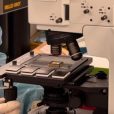Every 19 minutes someone has a stroke. In 2019 that was 13 million people globally.
During a stroke, the lack of oxygen caused by the blockage of blood vessels kills 1.9 million brain cells per minute.
The medical interventional methods available to stroke patients are limited and focus on removing the clot chemically or mechanically. Doctors employ anticoagulants and thrombolytic drugs to break down the clot causing the blockage. Oftentimes they resort to physically removing the clot with a catheter or in some cases, surgery.
Restricting the amount of damage to the brain is challenging and time sensitive. Only 35% of all patients with acute stroke arrive at hospital within the critical 4.5 hour time frame for treatment. Failure to treat stroke within this narrow time frame is associated with poor clinical outcomes and long term issues. Strokes can affect the functioning of almost any system within the body, depending on where in the brain the stroke occurs.
There is currently no neuroprotective drug on the market that can be administered to slow the effects of hypoxia in the brain.
Pioneering the vision to fill this critical market gap is pre-clinical drug development company Argenica Therapeutics. Their neuroprotective compound, rich in their namesake arginine peptides, is emerging as a promising solution to this complex problem.
The ARG-007 compound was developed by researchers at the University of Western Australia and the Perron Institute for Neurological and Translational Science and has demonstrated improved outcomes in pre-clinical models of stroke.
These preliminary results spurred the incorporation of Argenica in November 2019 to develop and commercialise the drug.
Despite the Company’s words of caution about its inability to generate any material revenue in the near term, investors showed overwhelming interest in Argenica’s IPO. The offer was $0.20 per share to raise $7 million and the Company is expected to list on the ASX on June 10th. Following the completion of the offer Argenica’s implied market capitalisation will be over $14.6 million.
The Company hopes to begin phase 1 clinical trials in humans in the 12 months following the completion of the offer.
Investment in the Company poses significant risk, which Argenica are all too aware of. Its limited operating history and confirmed need for future capital requirements might concern some. Argenica’s prospectus highlights the outstanding need for the Company to generate clinical data in humans which will first require approval to undertake clinical trials. Assuming that the work done in animal models translates to humans and phase 1 clinical trials move forward, drug development is a lengthy process that usually takes between 7 and 11 years from commencement of clinical trials to final drug development.
There really is no assurance that the Company will be able to push the drug through the stringent regulatory process and generate revenue from its commercialisation. The Company wishes to on-sell or license ARG-007 through a suitable pharmaceutical company rather than selling directly to the consumer market.
In addition to this there are half a dozen companies seeking to develop similar drugs for neuroprotection in stroke patients, some of which have progressed to stage 3 clinical trials.
While the need for a neuroprotective drug to improve outcomes post stroke is increasingly urgent and important, there are a lot of ‘ifs’ and no guarantees with Argenica’s single product.
AGN is expected to list on the ASX on 10 June 2021. Alto Capital was the Lead Manager of the capital raise.

Figure 1: Drug Research and Development Process (Source: Seikagaku Corporation https://www.seikagaku.co.jp/en/development/flow.html
- Parkinson’s UK backs Pharmaxis with $5 million to slow the onset of incurable disease with ‘ground breaking’ trial - September 1, 2022
- How this company is developing medtech to support Indigenous community health - August 22, 2022
- A round of ap-paws for PharmAust, changing the ruff prognosis for dogs with lymphoma - August 17, 2022













Leave a Comment
You must be logged in to post a comment.